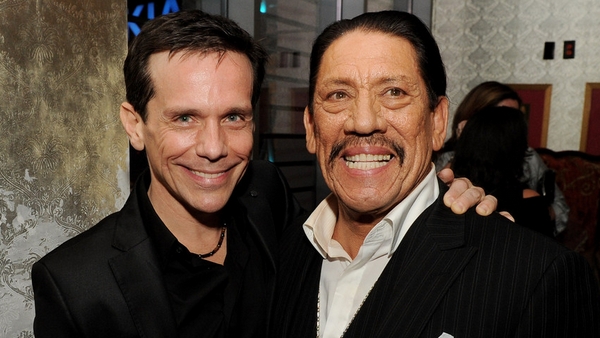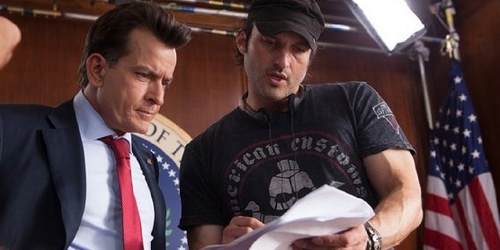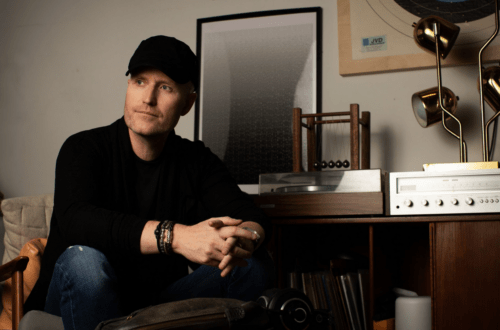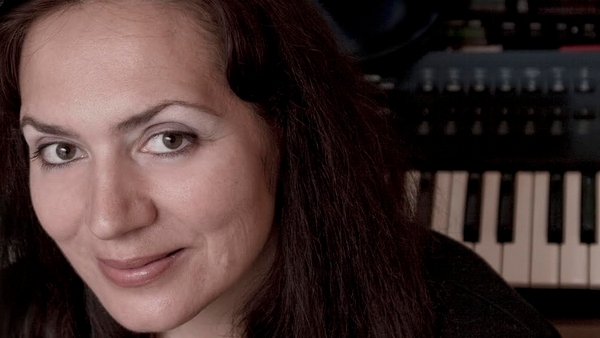 Award-winning music writer/producer and film composer Carl Thiel was born into a European family and raised in Mexico City, Carl was exposed to a rich and wide variety of cultural experiences and musical styles from a very early age. As a young boy, he would listen to his father (a Swedish immigrant with a doctorate in music) play Mozart and Bach on the piano, while his older siblings would play Beatles and Carpenters albums.
Award-winning music writer/producer and film composer Carl Thiel was born into a European family and raised in Mexico City, Carl was exposed to a rich and wide variety of cultural experiences and musical styles from a very early age. As a young boy, he would listen to his father (a Swedish immigrant with a doctorate in music) play Mozart and Bach on the piano, while his older siblings would play Beatles and Carpenters albums.
His mother, a perpetual student of the spiritual and healing arts and the daughter of German and Austrian immigrants, shared her love for Strauss and Vivaldi, as well as meditation and inspirational music. Immersed in the huge metropolis, it was impossible for young Carl to escape the colorful variety of Mexican music present at every corner, ranging from songs of traditional artists such as Agustín Lara and Los Panchos, to pop legends José José and Emmanuel, to all the folk and pre-hispanic sounds and melodies that live at the heart of the Mexican culture.
We got to talk with this talented musician about working with Robert Rodriguez in Part I of our interview. Now enjoy the second half of our session with Machete Kills composer Carl Thiel…
————————————————————————————————————————————
– Chingón was credited with scoring the first Machete and is comprised of John Debney, Rick del Castillo, Robert Rodriguez and yourself. But first off, Chingón means “bad-ass”, right?
Yeah it does. It’s not a word you want to share with your Grandma down in Mexico that’s for sure *laughs*. Funny story about the name, there was an award ceremony here in Texas a few years ago, I can’t remember what it was called, but they invited Robert to come in because they wanted him to perform but they had some issues with the name of the band – they couldn’t air it in Mexico and Spanish speaking networks – which was just a funny side effect of having such a name for the band *laughs*.
– Now for the sequel it’s just you with a couple cues written by Robert. Was it scheduling that you couldn’t all work on this again in some way?
Well Chingón is a conceptual band that Robert dreamed up and put together to create music and sound for his movies. If you look back as far as “Once Upon a Time in Mexico” there’s a couple tracks there that were made by quote unquote Chingón. The band has evolved over the years and changed band members, but it’s basically Mariachi music on steroids. We actually had a track on “Kill Bill 2” if you look at the end credits you’ll see the last song in the movie is by us. Robert likes to have a big hand in some of the music that goes into his movies. When we ended up working on the first Machete film a lot of us ended up working on the movie and rather give credit to 5 or 6 people and composers he just put it all together as Chingón. Although Chingón nowadays gets to perform every once in a while Robert likes to play live, he’s a great guitar player, and there’s some fantastic musicians here in Austin a lot, there’s one band here that we like to use a lot it’s the band name del Castillo, various members of that band join us to create Chingón when we perform live.
– Awesome. Well Chingón actually had a bit of a cameo in the movie, its name was featured on the back window of that souped the El Camino (which was built by Jesse James for the film – pictured her below) right?
Haha, Yes, exactly! Like I said Robert loves music and he’s a
great musician so as Chingón was his baby he really wanted to give them as much attention as possible. He loves promoting it, and if he had more time he would perform with Chingón a lot more often. But there’s just so much going on in his world it’s hard to manage everything you know?
– Yeah I imagine a guy like Robert wears so many hats that he probably never sleeps. Now since the movie is very over-the-top and as you got to be involved months before he started shooting you got to see the madness develop as opposed to a composer who’s brought in after everything’s shot and edited. When you went to the set and saw dailies did you ever wonder “what did I get myself into?“
Well kind of yeah *laughs*. It’s funny, on the first Machete film when I got the script and read it way before they even shot it I was looking at the pages and just laughing out loud thinking “how the hell are they going to pull this off?”. It was so wild and I couldn’t believe they were going there. One of the craziest things I’m referring to is in the hospital scene when Machete makes his escape out the window. That was a hilarious moment that I couldn’t imagine how it would be done visually. But of course it came out great and became one of the most memorable scenes in the movie.
But it’s the same thing with this movie you know. There’s all this insanity happening in the script and because Robert is Robert he tries to make it all as crazy as possible. When you see the finished project it’s hard to believe that he went from crazy words on paper to this over the top thing flying across the screen. Also he is so dedicated to his work he edits to the last minute. Even after all the work is done he’ll still be at it staying up late the last three to four tweaking things and fine tuning it all to make sure it’s as good as it can be.
– Now the score has a lot of hard-edged, scratchy heavy metal sounds to it. I see you worked with Annette Fradera as the “Mexican music consultant” on the first film…what was that about? I didn’t catch her name in the credits, but did she help with the sequel?
Yeah, I wanted the edgier metallic sounds to mirror the roughness of Machete’s character, and the challenges he was facing. With a name like “Machete” the first thing you think about is sharp rusty metal!
Annette Fradera helped with the song “El Rey” on the first film. Robert wanted to use that classic mariachi song for a particular scene, and Annette helped find and record a mariachi group in Mexico. But now, she was not involved in the sequel.
– I’m just fascinated in the scoring process and what music adds to a film, which is why focus on film scores are a smaller side portion of GoSeeTalk. A few cleverly and creatively placed notes can one day become iconic themes even if to the creative team it was just “all in day’s work”. Tell me about that process, sort of a day in the life of Carl, even if it is mundane.
I believe music is an essential defining element, and can either make or break a movie. “Star Wars” wouldn’t be half the success it still is without John Williams’s brilliant score. Imagine if the score was instead something like Flash Gordon. It would’ve been a very different experience.
I love film, and I love music, so I feel very fortunate to be able to play in both worlds. I go to a lot of movies, and whenever I hear something in the score that perks up my ear or evokes an emotional response in me I immediately go buy the soundtrack and study it. I like to continue to grow, and with every new film, I try to get out of my comfort zone and explore new chord progressions, melodies, sounds and instruments to bring something unique to the project.
I am constantly writing, even if I’m in between projects. I have a piano and a guitar at home, and I like to noodle around and let my fingers go where they want to, just stream of consciousness kind of thing. And whenever something sounds cool or catchy to me, I’ll record it on my phone. I’ve got tons of ideas recorded there. Later when I’m working on a movie, if I’m having trouble coming up with a particular idea, I’ll go over those recordings to see if I find something that strikes the right mood. Sometimes I’m surprised by what I find there. It’s a great resource to rely on in a pinch!
– I like what you said about Williams just now. For years I’ve wondered whether or not Star Wars would have the same endearing qualities and resonance if it weren’t backed by his sensational score, so I’m glad to to hear you say that. It could have been just another throwaway space opera if it wasn’t for those cues he brought to the film.
Yeah I’m such a big fan of John and really I do you think that that movie has such a huge amount of impact because of that score it gives it the seriousness and wait did it has. You know if you take that away it’s just another sci fi movie as you said, not to take anything away from it or diminish the qualities of the film itself because it’s a great story and the visuals are fantastic is very unique a lot of ways but if it didn’t have the score and that particular score it would have been a very different experience.
– Going back to what you said about The Chamaleon, having a couple themes in your pocket before you started must have been nice, but in the movie you’ve got themes running all over the place. There’s a theme for Sheriff Doakes, Mendez, Miss San Antonio and President Rathcock, so how do you keep everything from becoming jumbled? Also how do you decide who gets one and who doesn’t? I think the only person who didn’t get one was ‘She’ (the character played by Michelle Rodriguez).
Yeah that’s interesting you bring that up, ‘She’ did have a theme in the movie but her presence wasn’t as outstanding as it was in the first movie. We had written a theme for the first Machete but unfortunately we didn’t get to release a soundtrack. If we had that would have been one of the highlights on it. And you’re right with so many different characters and so many different themes we had to make some cuts. The particular cues we wrote for ‘She’ didn’t really stand out so she was one of the ones we had to cut. But you can hear bits of her theme from the first film in a couple little sections like “Taco Time” as well as “Chick Fight”. There’s moments in that track and the movie where you hear it especially in the, well I don’t want to give anything away, but when she does her final move against the the enemy.
– One thing I really enjoyed and laughed at was the the third track on the album called They Call Him “Machete” but it wasn’t used in the film and I wonder why?
No it was not used in the movie, and I’m glad you pointed that out. Robert had this vision that throughout the movie you’d hear people say things like “people sing songs about you Machete” and really had this strong idea about putting that song at the end. He called it the great song about machete, but honestly we just ran out of time, we had so many things to do it just didn’t make it in the film.
But when we got the call to do a soundtrack CD for the film Robert jumped on the opportunity and said “let’s do it! Record the song and put it in there!”. And I think Robert has the intention of putting the song in the DVD version when it comes out.
– Now that would be awesome because it is such a great song! That’s one thing I wanted to ask you about. It sounds like Cheech Marin – I’m pretty sure it isn’t, but come on tell me, did you get Cheech to sing on that track?
Oh *laughs* no that wasn’t Cheech *laughs* it’s Alex Ruiz. He’s a fantastic singer and one of the main guys who sings for us so whenever you see Chingón live he’s the one who singing. He’s a local Austin guy and just fantastic.
————————————————————————————————————————————
Robert Rodriguez’s Machete Kills is in theaters now (check out our review here). Thanks again to Carl Thiel for his time participating in this interview.



